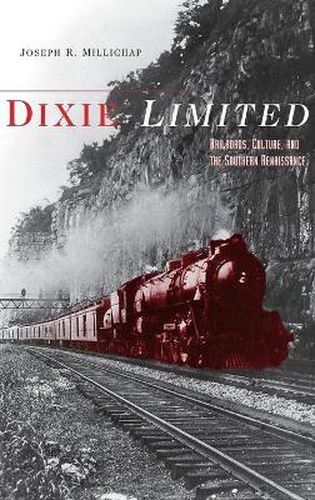Readings Newsletter
Become a Readings Member to make your shopping experience even easier.
Sign in or sign up for free!
You’re not far away from qualifying for FREE standard shipping within Australia
You’ve qualified for FREE standard shipping within Australia
The cart is loading…






In the South, railroads have two meanings: they are an economic force that can sustain a town and they are a metaphor for the process of southern industrialization. Recognizing this duality, Joseph Millichap’s Dixie Limited is a detailed reading of the complex and often ambivalent relationships among technology, culture, and literature that railroads represent in selected writers and works of the Southern Renaissance. Tackling such Southern Renaissance giants as Thomas Wolfe, Eudora Welty, Robert Penn Warren, and William Faulkner, Millichap mingles traditional American and Southern studies – in their emphases on literary appreciation and evaluation in terms of national and regional concerns – with contemporary cultural meaning in terms of gender, race, and class. Millichap juxtaposes Faulkner’s semi-autobiographical families with Wolfe’s fiction, which represents changing attitudes toward the Southern Other. Faulkner’s later fiction is compared to that of Warren, Welty, and Ellison, and Warren’s later poetry moves toward the contemporary post-Southernism of Dave Smith. These disparate examples suggest the subject of the final chapter – the continuing search for post-Southern patterns of persistence and change that reiterate, reject, and perhaps reconfigure the Southern Renaissance. As we enter the twenty-first century, that we recall how much the twentieth-century South was shaped by railroads built in the nineteenth century. It is also important that we recognize how much our future will be determined by the technological and cultural tracks we lay.
$9.00 standard shipping within Australia
FREE standard shipping within Australia for orders over $100.00
Express & International shipping calculated at checkout
In the South, railroads have two meanings: they are an economic force that can sustain a town and they are a metaphor for the process of southern industrialization. Recognizing this duality, Joseph Millichap’s Dixie Limited is a detailed reading of the complex and often ambivalent relationships among technology, culture, and literature that railroads represent in selected writers and works of the Southern Renaissance. Tackling such Southern Renaissance giants as Thomas Wolfe, Eudora Welty, Robert Penn Warren, and William Faulkner, Millichap mingles traditional American and Southern studies – in their emphases on literary appreciation and evaluation in terms of national and regional concerns – with contemporary cultural meaning in terms of gender, race, and class. Millichap juxtaposes Faulkner’s semi-autobiographical families with Wolfe’s fiction, which represents changing attitudes toward the Southern Other. Faulkner’s later fiction is compared to that of Warren, Welty, and Ellison, and Warren’s later poetry moves toward the contemporary post-Southernism of Dave Smith. These disparate examples suggest the subject of the final chapter – the continuing search for post-Southern patterns of persistence and change that reiterate, reject, and perhaps reconfigure the Southern Renaissance. As we enter the twenty-first century, that we recall how much the twentieth-century South was shaped by railroads built in the nineteenth century. It is also important that we recognize how much our future will be determined by the technological and cultural tracks we lay.